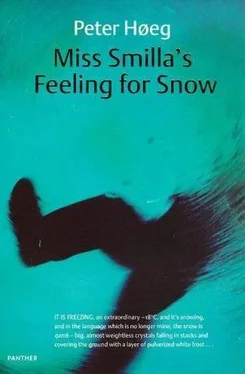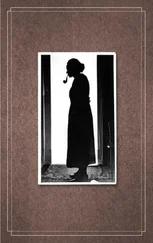Peter Høeg - Smilla's Sense of Snow aka Miss Smilla's Feeling for Snow
Здесь есть возможность читать онлайн «Peter Høeg - Smilla's Sense of Snow aka Miss Smilla's Feeling for Snow» весь текст электронной книги совершенно бесплатно (целиком полную версию без сокращений). В некоторых случаях можно слушать аудио, скачать через торрент в формате fb2 и присутствует краткое содержание. Жанр: Современная проза, на английском языке. Описание произведения, (предисловие) а так же отзывы посетителей доступны на портале библиотеки ЛибКат.
- Название:Smilla's Sense of Snow aka Miss Smilla's Feeling for Snow
- Автор:
- Жанр:
- Год:неизвестен
- ISBN:нет данных
- Рейтинг книги:3 / 5. Голосов: 1
-
Избранное:Добавить в избранное
- Отзывы:
-
Ваша оценка:
- 60
- 1
- 2
- 3
- 4
- 5
Smilla's Sense of Snow aka Miss Smilla's Feeling for Snow: краткое содержание, описание и аннотация
Предлагаем к чтению аннотацию, описание, краткое содержание или предисловие (зависит от того, что написал сам автор книги «Smilla's Sense of Snow aka Miss Smilla's Feeling for Snow»). Если вы не нашли необходимую информацию о книге — напишите в комментариях, мы постараемся отыскать её.
Smilla's Sense of Snow aka Miss Smilla's Feeling for Snow — читать онлайн бесплатно полную книгу (весь текст) целиком
Ниже представлен текст книги, разбитый по страницам. Система сохранения места последней прочитанной страницы, позволяет с удобством читать онлайн бесплатно книгу «Smilla's Sense of Snow aka Miss Smilla's Feeling for Snow», без необходимости каждый раз заново искать на чём Вы остановились. Поставьте закладку, и сможете в любой момент перейти на страницу, на которой закончили чтение.
Интервал:
Закладка:
But standing in front of the winches for lowering the boat, I have to give up. The system of carabiners and cables is too complicated. I rip the tarp off the boat, looking for something to defend myself with. A boat hook or a flare.
The tarp is made of heavy green nylon with elastic along the edge that fits around the gunwale of the boat. When I lift it up, the wind pulls it free and it flaps out over the side of the ship. It catches on an eyelet on the bow of the lifeboat.
Verlaine is up an deck. Hansen is right behind him. I grab the tarp and step over the side. The Kronos rolls and I'm lifted free; wrapping my thighs around the tarp, I lower myself down. At the end of the tarp my feet dangle in midair. Then I fall. They've cut the tarp loose. I fling out my arms and the sea rail catches me in the armpits. My knees strike the side of the ship. But I keep hanging there, momentarily paralyzed because the breath was knocked out of me. Then I slide headfirst onto the upper deck.
An absurd fragment of memory brings up images of the first time I ever played tag, right after I arrived in Denmark-my unfamiliarity with the game, which quickly eliminated the weak, and then, through a natural hierarchy, everyone else.
The door to the stairway opens and Hansen appears. I head across the quarterdeck, making it over to the stairs leading up to the boat deck. At eye level a pair of blue shoes is coming down the steps. I stick my hands under the railing and shove the shoes outward. It's a continuation of their own movement, so it doesn't take much force. The feet sail out into the air in a small arc, and Verlaine's head strikes the step next to my shoulders. Then he plummets down the last few yards and hits the deck without being able to break his fall.
I run up the stairs. On the boat deck I cross over to starboard and then climb up the ladder. Maurice must have heard me. As I climb he comes over to the ladder. Behind him the door to the bridge opens and Kutzow appears. He's wearing a bathrobe and is barefoot. He and Maurice stare at each other. I walk past them into the I bridge.
I fumble for the flashlight in my pocket. The beam catches Sonne's face. Maria is standing at the tiller. "Let me into the sick bay," I say. "I've had an accident."
Sonne leads the way. Outside the chart room he turns around and stops dead. I look down at myself. The knees of my jogging pants are gone; instead, there are two bloody holes. The palms of both hands are lacerated.
"I fell," I tell him.
He unlocks the sick bay. He avoids looking at me directly.
When I sit down and the skin tightens across my knees, I almost faint. A flood of tiny, painful memories washes over me: the first stairs in boarding school and falling on rough ice-flashes of light, numbness, heat, sharp pain, cold, and finally a dull throbbing.
"Could you clean it for me?"
He looks away. "I can't stand the sight of blood."
I clean it myself. My hands shake, the liquid runs down over my wounds. I put on sterile compresses and wrap gauze around them.
"Give me some Cliradon," I say.
"That's against regulations."
I stare up at him. He takes out a bottle. "And amphetamines."
Every ship's pharmacy and every expedition has a supply of medicine to stimulate the central nervous system and relieve the feeling of exhaustion.
He hands me some. I crush five tablets into a paper cup with water. They taste bitter.
I'm having a hard time using my hands. He takes out a pair of white, tight-fitting cotton gloves, the kind worn by people with allergies.
As I go out the door he tries to smile bravely. "Feeling better now?"
He is the quintessential Dane, with his fear, his iron resolve to repress what's happening around him. And his indomitable optimism.
The rain hasn't let up. It looks like ropes of water slanting across the windows of the bridge. The dim gray of faint daylight is appearing.
"Where's Lukas?"
"In his cabin."
A man who hasn't slept for forty-eight hours is useless. "He goes on watch in an hour," says Sonne. "In the crow's nest. He wants to see the ice for himself."
One of the radar screens is fixed on a radius of fifty sea miles. A short distance from the edge it shows a crosshatched green continent. The beginning of the field ice. "Tell him that I'll be up to see him," I say.
The deck of the Kronos is deserted. It no longer resembles anything on board a ship. The faint daylight forms deep shadows, but they're not just shadows anymore. In every patch of darkness an inferno is raging. When I was a child, this atmosphere accompanied every death. Somewhere women would start shrieking, and then we knew that someone had died; this awareness would transform the area. Even if it was May in Siorapaluk, with a bluishgreen light flooding down, penetrating everything and making people crazy with the spring, even this kind of light would be transformed to the cold reflection of a realm of the dead that had moved up aboveground.
A ladder goes up along the front of the mast. The crow's nest is a flat aluminum box furnished with windows both fore and aft. Mandatory on any ship that sails in ice.
It's sixty-five feet to the top. It doesn't look like much on my sketch of the Kronos. But the climb up is terrifying. The ship pitches through the sea and rolls sideways; all the movements at the hull's fulcrum become magnified the higher I go, and the oscillation of the mast is more extreme.
The rungs come to an end at a platform, above which the block of the derrick is attached. From there you step up onto a smaller platform and then through a little door into the metal shed.
It's just high enough to stand up. In the darkness I can make out an old-fashioned engine room telegraph, a tilt gauge, a log, a large compass, a tiller, and the intercom to the bridge. When we enter the field ice, Lukas will steer the Kronos from up here. Only from here will there be sufficient visibility.
There's a seat along the back wall. When I come in, he moves aside and makes room for me. I see him as a denser shape in the darkness. I want to tell him about Jakkelsen. On every ship the captain has some type of weapon. And he still has his position of authority. It must be possible to hold Verlaine at bay, to turn the ship around. We should be able to reach Sisimiut within seven hours.
I slide onto the seat. He puts his feet up on the telegraph. It's not Lukas, it's Tørk.
"The ice," he says. "We're getting close to the ice." It's barely visible, like a grayish-white light on the horizon. The sky is low and dark like coal smoke, with a few lighter patches.
The little cabin that we're in jolts from side to side. I roll toward him and then back over to the wall. He doesn't move. With his boots up on the telegraph and his hand on.his chair, he seems to be wedged tight.
"You went ashore on the Greenland Star. You were in the forward part of the ship when the first fire alarm went off. Kutzow has seen you walking around at night several times. Why?"
"I'm used to being able to move freely aboard ship." I can't see his face; I can barely make out his profile.
"What ship? You only gave the captain your passport. I faxed the Marine Transport Commission. They've never issued a discharge book in your name."
For a moment the temptation to give up is overwhelming.
"I sailed on smaller ships. They never ask for papers outside the merchant fleet."
"So you heard someone mention this job and contacted Lukas."
It's not a question, so I don't reply. He's studying me. He probably can't see any better than I can.
"This voyage wasn't mentioned anywhere. It was kept secret. You didn't contact Lukas. You got Lander, the owner of a casino, to set up a meeting."
His voice is low, interested. "You sought out Andreas Licht and Ving. You're looking for something."
Читать дальшеИнтервал:
Закладка:
Похожие книги на «Smilla's Sense of Snow aka Miss Smilla's Feeling for Snow»
Представляем Вашему вниманию похожие книги на «Smilla's Sense of Snow aka Miss Smilla's Feeling for Snow» списком для выбора. Мы отобрали схожую по названию и смыслу литературу в надежде предоставить читателям больше вариантов отыскать новые, интересные, ещё непрочитанные произведения.
Обсуждение, отзывы о книге «Smilla's Sense of Snow aka Miss Smilla's Feeling for Snow» и просто собственные мнения читателей. Оставьте ваши комментарии, напишите, что Вы думаете о произведении, его смысле или главных героях. Укажите что конкретно понравилось, а что нет, и почему Вы так считаете.




![Рута Шепетис - Ashes in the Snow [aka Between Shades of Gray]](/books/414915/ruta-shepetis-ashes-in-the-snow-aka-between-shades-thumb.webp)







